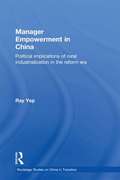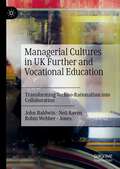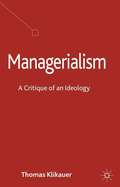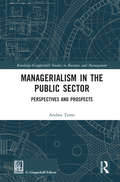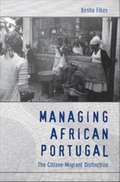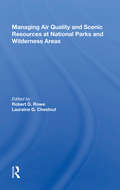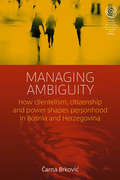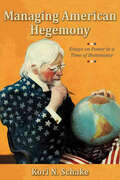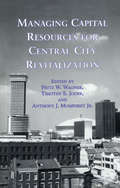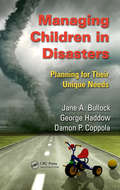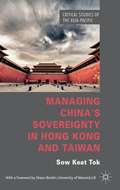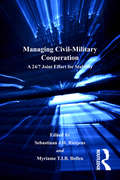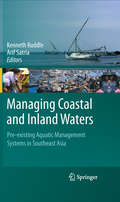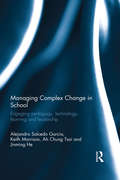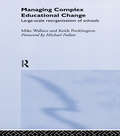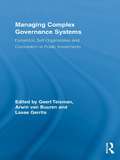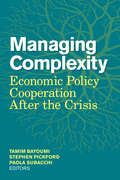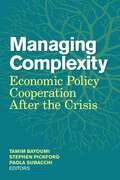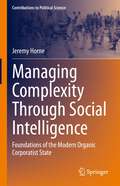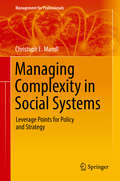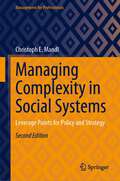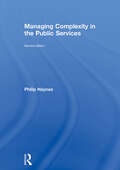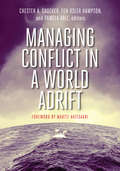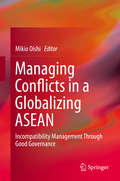- Table View
- List View
Manager Empowerment in China: Political Implications of Rural Industrialisation in the Reform Era (Routledge Studies on China in Transition #Vol. 14)
by Ray YepInstitutional changes in rural China caused by the economic reforms of the post-Mao era have led to a new pattern of state-society interaction in the rural polity. Central to this is the spectacular rise of a group of managerial elites. Contrary to economic predictors, this has been accompanied by the development of an interdependence between these managers and the state. This book provides an analysis of the new state-society relationship and demonstrates the complexity and fluidity involved in institutional development and market transformation.
Managerial Cultures in UK Further and Vocational Education: Transforming Techno-Rationalism into Collaboration
by John Baldwin Neil Raven Robin Webber - JonesThis book offers unique insights into the impact of the rise of a managerialist culture in Further Adult and Vocational Education (FAVE) in England. It will also raise awareness of the consequences of the imposition of top-down models of educational change and improvement upon the practices of educational leaders, middle and senior managers and policy professionals across the FAVE sector. The overall aim of this book is to understand the language, policies, values and approaches currently espoused in post-16 learning. Often these are driven by, or measured by, technical-rational approaches which can have a negative impact on individuals working in the sector, lead to a narrowing of the curriculum and range of assessment opportunities, and do not support student progression. The authors propose tentative, researched, and evidence-based suggestions for new ways of working which might, ultimately, have a significant benefit to post-16 learning. The book will appeal to those engaged in researching education – either as academics, policy makers, trainees, or practitioners who are interested in ways of reflecting on, researching into, and improving practice.
Managerialism
by Thomas KlikauerMost people know what management is but often people have vague ideas about Manageralism. This book introduces Manageralism and its ideology as a colonising project that has infiltrated nearly every eventuality of human society.
Managerialism in the Public Sector: Perspectives and Prospects (Routledge-Giappichelli Studies in Business and Management)
by Andrea TomoThe purpose of this book is to offer insights into the complex and often unclear context of public sector management, providing a new theoretical and practical approach to the analysis and interpretation of these issues. The book is grounded in the awareness that the public sector has too often shown inefficiencies, despite the expensive measures taken, and from manifold perspectives such as the economic, social, organizational, and institutional ones, among others. It acknowledges the lack of behavioral, cultural, and context-oriented research in the field, thus proposing to innovate the debate and to expand the current understanding of which organizational features characterize modern public administrations, what factors influence the predominance of different models, with a special focus on the Italian setting, benefiting from a wholly comprehensive innovative methodological approach. The findings offer key implications for theory, practice, and policy-making, contending the importance of holistic approaches to the debate and abandoning pre-constituted schemes to put forth the relevance of behavioral models. It offers a key message: contextual-specific and cultural factors influencing individual behaviors are important and should better influence policy-making processes, towards "glocalization" in order to improve quality.
Managing African Portugal: The Citizen-Migrant Distinction
by Kesha FikesIn Managing African Portugal, Kesha Fikes shows how the final integration of Portugal's economic institutions into the European Union (EU) in the late 1990s changed everyday encounters between African migrants and Portuguese citizens. This economic transition is examined through transformations in ideologies of difference enacted in workspaces in Lisbon between the mid-1990s and the early 2000s. Fikes evaluates shifts in racial discourse and considers how both antiracism and racism instantiate proof of Portugal's European "conversion" and modernization. The ethnographic focus is a former undocumented fish market that at one time employed both Portuguese and Cape Verdean women. Both groups eventually sought work in low-wage professions as maids, nannies, and restaurant-kitchen help. The visibility of poor Portuguese women as domestics was thought to undermine the appearance of Portuguese modernity; by contrast, the association of poor African women with domestic work confirmed it. Fikes argues that we can better understand how Portugal interpreted its economic absorption into the EU by attending to the different directions in which working-poor Portuguese and Cape Verdean women were routed in the mid-1990s and by observing the character of the new work relationships that developed among them. In Managing African Portugal, Fikes pushes for a study of migrant phenomena that considers not only how the enactment of citizenship by the citizen manages the migrant, but also how citizens are simultaneously governed through their uptake and assumption of new EU citizen roles.
Managing Air Quality And Scenic Resources At National Parks And Wilderness Areas
by Robert D. RoweThis book is an outcome of the Visual Values Workshop in 1982. It presents the ongoing research on state-of-the-art techniques and applications to address the human perception of changes in visual aesthetic resources and to assign psychological, social, and economic measures of value to visitors.
Managing Ambiguity: How Clientelism, Citizenship, and Power Shape Personhood in Bosnia and Herzegovina (EASA Series #31)
by Čarna BrkovićWhy do people turn to personal connections to get things done? Exploring the role of favors in social welfare systems in postwar, postsocialist Bosnia and Herzegovina, this volume provides a new theoretical angle on links between ambiguity and power. It demonstrates that favors were not an instrumental tactic of survival, nor a way to reproduce oneself as a moral person. Instead, favors enabled the insertion of personal compassion into the heart of the organization of welfare. Managing Ambiguity follows how neoliberal insistence on local community, flexibility, and self-responsibility was translated into clientelist modes of relating and back, and how this fostered a specific mode of power.
Managing American Hegemony: Essays on Power in a Time of Dominance
by Kori N. SchakeKori Schake examines key questions about the United States' position of power in the world, including, Why is the United States' power so threatening? Is it sustainable? Does military force still matter? How can we revise current practices to reduce the U.S. cost of managing the system? What accounts for the United States' stunning success in the round of globalization that swept across the international order at the end of the twentieth century? The author also offers suggestions on what issues the next president should focus to build an even stronger foundation of U.S. power.
Managing Capital Resources for Central City Revitalization (Contemporary Urban Affairs #7)
by FRITZ W. WAGNER, TIMOTHY E. JODER AND ANTHONY J. MUMPHREYFirst Published in 2000. This book and its companion volume, Human Capital Investment fo r Central City Revitalization, are the products of a two-year endeavor by the National Center for the Revitalization of Central Cities. The National Center is a consortium of academic institutions that analyzes critical problems facing America’s central cities, evaluates strategies to address those problems, and recommends policy alternatives.
Managing Children in Disasters: Planning for Their Unique Needs
by Damon P. Coppola George Haddow Jane A. BullockEach year, disasters such as house fires, car accidents, tsunamis, earthquakes, and hurricanes impact hundreds of thousands of children. Child victims can suffer disproportionately and the physical and psychological damage sustained can far outweigh the same effects in adults, often requiring years of therapy. Sadly, emergency planners to date have
Managing China's Sovereignty in Hong Kong and Taiwan
by Sow Keat TokIs China always defensive about its sovereignty issues? Does China see sovereignty essentially as 'absolute,' 'Victorian,' or 'Westphalian?' Sow Keat Tok suggests that Beijing has a more nuanced and flexible policy towards 'sovereignty' than previously assumed. By comparing China's changing policy towards Taiwan and Hong Kong, the author relates the role of previous conceptions of the world order in China's conception of modern 'sovereignty', thereby uncovers Beijing's deepest concern when dealing with its sovereignty issues.
Managing Civil-Military Cooperation: A 24/7 Joint Effort for Stability (Military Strategy and Operational Art)
by Myriame T.I.B. BollenCivil-military cooperation has always been a key factor in both peace and conflict situations, and is vital in today's political climate. This indispensable volume analyzes the various types of civil-military cooperation across different settings and contexts, to include humanitarian operations such as emergency relief following tsunami, earthquakes and refugee crises, as well as stability and reconstruction operations such as those in Afghanistan and the Democratic Republic of Congo. The book contains contributions from both senior academics and practitioners such as military officers and humanitarian personnel and discusses the benefits and logistics of civil-military cooperation. It closes with recommendations that will be of value to both academics and practitioners, making it a must read for anyone interested or involved in these operations.
Managing Coastal and Inland Waters
by Arif Satria Kenneth RuddleBesides the erroneous assumption that tropical fisheries are 'open access', the cases demonstrate that pre-existing systems (1) are concerned with the community of fishers and ensuring community harmony and continuity; (2) involve flexible, multiple and overlapping rights adapted to changing needs and circumstances; (3) that fisheries are just one component of a community resource assemblage and depend on both the good management of linked upstream ecosystems and risk management to ensure balanced nutritional resources of the community; and (4) pre-existing systems are greatly affected by a constellation of interacting external pressures.
Managing Complex Change in School: Engaging pedagogy, technology, learning and leadership
by Keith Morrison Alejandro Salcedo Garcia Ah Chung Tsoi Jinming HeLeading and managing change in schools is a complex topic. In this timely book the authors take the reader through a journey of how to lead and manage multidimensional change in order to create engaged learners, teachers, leaders and managers. They provide a readable and straightforward account of a major, high-profile innovation in one school and draw from it key lessons for leaders and managers of change in schools. Managing Complex Change in School synthesizes a wealth of literature and research on managing change, and shows how the emerging field of complexity theory can inform the effective management of multidimensional change. Arising from an in-depth, mixed methods evaluation of the key school, this book is practice-focused and is an invaluable companion for practitioners handling positive change in schools.
Managing Complex Educational Change: Large Scale Reorganisation of Schools
by Michael Wallace Keith PocklingtonWhy is educational change becoming more complex? Are there patterns in this complexity? How may managers cope effectively with complex educational change?This book investigates initiatives to reorganise school systems, involving highly emotive closures and mergers. It reveals how reorganisation was a complex change to manage because it was large-scale, componential, systematic, differentially impacting and context dependent. These characteristics affected management tasks, generating ambiguity in the change process that limited managers' capacity to control it. The authors offer four management themes as realistic strategies for coping with complex educational change:*orchestration*flexible planning and coordination*culture building and communication*differentiated supportManaging Complex Educational Change is essential reading for all concerned with educational change - managers in schools and colleges, students on advanced courses, trainers, local and regional administrators, academics and policy makers. The research has general implications for the theory and practice of managing complex change.
Managing Complex Governance Systems (Routledge Critical Studies in Public Management)
by Arwin Van Buuren Geert Teisman Lasse M. GerritsAdvances in public management sciences have long indicated the empirical finding that the normal state of public management systems is complex and that its dynamics are non-linear. Complex systems are subject to system pressures, system shocks, chance events, path-dependency and self-organisation. Arguing that complexity is an ever-present characteristic of our developed societies and governance systems that should be accepted, understood and adopted into management strategies, the original essays collected in this book aim to increase our understanding of complex governance processes and to propose new strategies for how public managers can deal with complexity in order to achieve high-quality research. The authors collected here use theoretical frameworks grounded in empirical research to analyze and explain how non-linear dynamics, self-organisation of many agents and the co-evolution of processes combine to generate the evolution of governance processes, especially for public urban and metropolitan investments. Managing Complex Governance Systems: Dynamics, Self-Organization and Coevolution in Public Investments offers readers an increased understanding of the main objective of public management in complexity--namely complex process system--and a strategy for accepting and dealing with complexity based on the idea of dual thinking and dual action strategies satisfying the desires of controlling processes and the need to adjust to changes simultaneously.
Managing Complexity
by Stephen Pickford Paola Subacchi Tanim BayoumiA critical look at the challenges facing international policy cooperation in the new postcrisis environment.The global financial crisis of 2007-09 highlighted the economic interdependencies between all major countries, raising the issues of international cooperation. Managing Complexity looks at how, following the global financial crisis, countries have changed the way they cooperate with each other on matters of economic policy. In this volume, the result of a joint research project of Chatham House and the International Monetary Fund, researchers and policymakers who were directly involved in the crisis take a critical look at the challenges facing international policy cooperation in the new postcrisis environment and at how the theory and practice of cooperation have evolved as a result of the crisis. are reluctant to concede their sovereignty for regional policy cooperation. At the same time, global institutions shaped by the post-war hegemonic international order are incapable of providing leadership for global policy cooperation. I cannot agree more with diagnoses made by managing complexity on the problems and causes of the lack of policy cooperation in the global economy. I am sure that managing complexity will help decision-makers to design better roadmap for policy cooperation so as to minimize the adverse spillovers of the reserve currency countries on the global economy."--Yu Yongding, Academician, Chinese Academy of Social Sciences (CASS); former Director, Institute of World Economics and Politics, CASS
Managing Complexity
by Stephen Pickford Paola Subacchi Tanim Bayoumihe financial crisis of 2007-09 spread across the globe, highlighting the economic interdependencies between all major countries and raising issues of international cooperation. Managing Complexity examines how, following the crisis, countries have changed the way they cooperate when it comes to economic policy.This volume, the result of a joint research project of Chatham House and the International Monetary Fund, brings together researchers and policymakers who were directly involved in the crisis. They provide a critical look at the challenges facing international policy cooperation and how the theory and practice of cooperation have evolved in the new postcrisis environment.
Managing Complexity Through Social Intelligence: Foundations of the Modern Organic Corporatist State (Contributions to Political Science)
by Jeremy HorneThis book presents solutions to problems that are total and based on thinking about how and why humans have organized themselves. It discusses how to avoid the now well-documented Holocene Extinction, propelled by climate change, wars, resource depletion, desertification, degrading knowledge quality, famine, and deterioration of societies overall. It explains why we cannot respond effectively with hedonistic, incompetent, corrupt, and anarchistic "liberal democracy" and why neither personality cult regimes can suffice. The book offers a model of an organic social structure embodying a collective consciousness of communitarianism and Platonic-style ethos. Putting an emphasis on the re-establishment of Classical Greek virtue, it offers solutions to resolve identity politics, alienation, and meritocracy. While doing so, the author opposes the "everyone is equal" ideology to govern the section of policymakers, instead circumscribing "rights" in terms of responsibilities, prioritizing education and training to carry forth the ethos of valuing truth above materialism, and developing Durkheim's social brain via a new discipline, "sociointelligence". The book goes on to explain how underpinning these elements is a comprehensive elucidation of often misunderstood words like "liberty", "freedom", "authoritarianism", and "democracy". All of these areas are arranged and combined in uniquely describing the organic society the author deems necessary to avoid human extinction. As a result, the book presents a “new organicity”, where the emerging transhumanism seeks to transcend hydrocarbon-based life with humanly-constructed life.This book will appeal to students, researchers, and scholars of political science, philosophy, and the social sciences interested in a better understanding of complexity, democratic theory, Holocene Extinction, organic thinking, and meritocratic societies.
Managing Complexity in Social Systems: Leverage Points for Policy and Strategy (Management for Professionals)
by Christoph E. MandlWhy do policies and strategies often fail, and what can be done about it? How can complexity be managed in cases where it cannot be reduced? The answers to these questions are anything but trivial, and can only be found by combining insights from complexity science, system dynamics, system theory and systems thinking. Rooted in the seminal works of Gregory Bateson, Jay Forrester, Donella Meadows, Peter Senge, W. Brian Arthur, John Sterman and Thomas Schelling, this book bridges the gap between rigorous science and real-life experience to explore the potential and limitations of leverage points in implementing policies and strategies. It also presents diagnostic tools to help recognize system archetypes, as well as the powerful language of stock and flow diagrams, which allows us to think in terms of circular causality. These tools are subsequently employed to thoroughly analyze particularly thorny problems such as global climate change, the tragedy of the commons, path dependence, diffusion of innovations, and exponential growth of inequality.
Managing Complexity in Social Systems: Leverage Points for Policy and Strategy (Management for Professionals)
by Christoph E. MandlThis book explores how to manage complexity in a highly interconnected world. How can complexity be managed when it cannot be reduced? From organizational addiction to market failure, from limits to growth to the rebound effect, from tragedy of the commons to path dependence, answers are anything but trivial, and can only be found by combining insights from complexity science, system dynamics, system theory and systems thinking. This book bridges the gap between rigorous science and real-life experience to explore the potential and limitations of systems archetypes and their leverage points in implementing effective policies and strategies. It is grounded in Jay Forrester’s language of stock and flow diagrams to address issues of circular causality and causal loops in social systems.The second edition has been completely updated, revised, and extended to thoroughly analyze super wicked problems such as global climate change, climate neutrality, and extremely rapid spread of epidemics. Furthermore, it offers a novel integration of Peter Senge’s concept of systems archetypes with Horst Rittel’s concept of wicked problems. “This text is an important contribution to an emerging field of thought. I have enjoyed and benefitted from reading this text; you will also.”Dennis L. Meadows, Emeritus Professor of Systems Management, University of New Hampshire, USA“This book looks at the world from a different, yet very effective vantage point: the systemic perspective… The author delivers a perfect introduction to systemic thinking, – unorthodox, insightful and practical.” Markus Schwaninger, Emeritus Professor of Management, University of St.Gallen, Switzerland
Managing Complexity in the Public Services
by Philip HaynesThe application of complexity theory to management and the social sciences has been a key development in theory and practice over the last decade. This approach questions the possibility of finding universal methods of practice, and proposes a pragmatic and humanistic management style that evolves out of a reflective method. The focus is on practitioners observing patterns of similarity and being adaptable in decision-making. Bringing complexity theory into management reveals the importance of organizational culture and effective communication because people, their values and their objectives are at the heart of this method. Information technology provides a framework for complex communication and knowledge use, but it cannot replace highly developed professional negotiations and cooperation. This book argues that the complexity of the public service world limits the usefulness of classical and rational scientific management approaches such as New Public Management. Excessive marketization threatens a collaborative approach and overly rigid approaches to performance management and strategic management can be dysfunctional. Managing Complexity in the Public Services 2nd Edition advances a method of management practice that copes with the stark realities of the complex and unpredictable public policy world. It develops pragmatic management practices from action research that will be valuable to both academics and practitioners. The result is a new value-based practice for the post-crisis public service world.
Managing Complexity: Economic Policy Cooperation after the Crisis
by Tamim Bayoumi Stephen Pickford Paola SubacchiA critical look at the challenges facing international policy cooperation in the new postcrisis environment. The global financial crisis of 2007-09 highlighted the economic interdependencies between all major countries, raising the issues of international cooperation. Managing Complexity: Economic Policy Cooperation after the Crisis looks at how, following the global financial crisis, countries have changed the way they cooperate with each otheron matters of economic policy. In this volume, the result of a joint research project of Chatham House and the International Monetary Fund, researchers and policymakers who were directly involved in the crisis take a critical look at the challenges facing international policy cooperation in the new postcrisis environment and at how the theory and practice of cooperation have evolved as a result of the crisis.
Managing Conflict in a World Adrift
by Fen Osler Hampson Chester A. Crocker Pamela AallThe eagerly anticipated follow up to Leashing the Dogs of War. In the midst of a global political shift where power moves from central institutions to smaller, more disbursed units, another landmark text edited by Chester A. Crocker, Fen Osler Hampson and Pamela Aall provides essential insights and practical guidance. In Managing Conflict in a World Adrift, 40 of the world's leading international affairs analysts examine the relationship between political, social or economic change and the outbreak and spread of conflict. They then consider what this means for conflict management. This panoramic study is the latest volume in a series of titles on conflict management edited by Crocker, Hampson and Aall and follows up on their seminal work Leashing the Dogs of War (2007). For more than a decade, this series of titles has been the definitive resource for students and practitioners of conflict management who want a better understanding of the most contemporary thinking about what causes conflict and how to prevent and manage it.
Managing Conflicts in a Globalizing ASEAN: Incompatibility Management through Good Governance
by Mikio OishiThis book investigates the patterns of conflict management in contemporary Southeast Asia. The region has long been characterized by the twin process of state-formation and nation-building, which has been responsible for most of the region’s intrastate and interstate conflicts. While this process is still ongoing, regional conflicts and their management are increasingly affected by globalisation, which not only serves as a new source of, or exacerbating factor to, conflict, but also makes new instruments available for conflict management. Employing the concepts of incompatibility management and mediation regime, the book analyses the management of seven conflicts in the region: the Rohingya crisis and the Kachin conflict in Myanmar, the Khmer Krom conflict in Vietnam, the West Papua conflict in Indonesia, the political conflict in Thailand, the Mekong River conflicts involving five Southeast Asian countries and China and the transboundary haze problem emanating from Indonesia. The efforts to manage each of them are imagined as constituting a mediation regime, and its effectiveness is assessed in terms of good governance. Among the findings of the book is that the measures of manoeuvring around incompatibilities are employed predominantly in managing regional conflicts. In intrastate conflicts, which mostly involve ethnic minorities, the authorities first aim to eliminate, or impose its own position on, ethnic parties. When this strategy proves unsuccessful, they have no choice but manoeuvre around incompatibilities, which may eventually open up a space for mutual learning. In interstate conflicts, the manoeuvring around strategy works in a more straightforward manner, contributing to regional stability. However, the stability is achieved at the cost of local communities and the natural environment, which absorb the incompatibilities in conflict.
